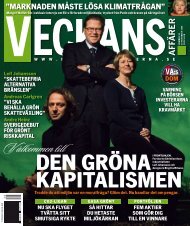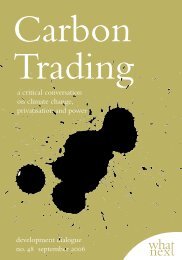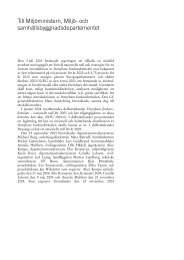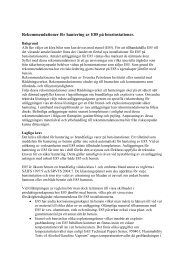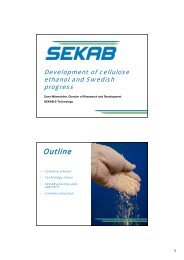Sugarcane ethanol: Contributions to climate change - BAFF
Sugarcane ethanol: Contributions to climate change - BAFF
Sugarcane ethanol: Contributions to climate change - BAFF
You also want an ePaper? Increase the reach of your titles
YUMPU automatically turns print PDFs into web optimized ePapers that Google loves.
Impacts of sugarcane bio<strong>ethanol</strong> <strong>to</strong>wards the Millennium Development Goals<br />
Rossi and Lambrou (2008) note some gender-di�erentiated risks. Marginal lands are<br />
particularly important for women. �e conversion of these lands <strong>to</strong> energy crops might<br />
cause displacement of women’s agricultural activities <strong>to</strong>wards increasingly marginal lands,<br />
with negative e�ects in their ability <strong>to</strong> meet household obligations. �is highlights the<br />
urgent need of a careful analysis of what the concept of ‘marginal’, ‘idle’ or ‘unproductive’<br />
lands really entails. It is in these lands where most government are mandating biofuels <strong>to</strong><br />
be grown.<br />
3.5. Quality of the employment<br />
<strong>Sugarcane</strong> bio<strong>ethanol</strong> will generate a range of employment opportunities, mostly in rural<br />
areas, which is certainly good for poverty reduction. However there are limitations and tradeo�s.<br />
Firstly, there is concern about the quality of employment, whether self-employment<br />
(small-scale farmers) or employment within large-scale operations (Worldwatch Institute,<br />
2006; UN-Energy, 2007). <strong>Sugarcane</strong> harvesting is extreme physically demanding. Production<br />
is highly seasonal and, in Brazil, for example, the ratio between temporary and permanent<br />
workers is increasing. Low skilled labour dominates the industry and a high rate of migrant<br />
labour is employed. In southern Africa the sudden in�ux of seasonal workers has had<br />
negative e�ects on community cohesion, causing ethnic tension and disintegration of<br />
traditional structures of authorities. Migrants behaviour is also linked with higher rates of<br />
HIV infection around sugarcane plantations (Johnson and Rosillo-Calle, 2007).<br />
Whilst over the latest years in some plantations in Brazil improvements in working conditions<br />
have been done, in other plantations, sugarcane cutters continue <strong>to</strong> work in appalling<br />
conditions. Cases of forced labour and poor working conditions within the sec<strong>to</strong>r are still<br />
reported (Oxfam, 2008). Other problems include a lack of agreed or enforceable working<br />
standards in many countries, and lack of labour representation (Dufey et al., 2007b).<br />
Moreover, compared <strong>to</strong> other feeds<strong>to</strong>cks (e.g. palm oil, cas<strong>to</strong>r oil, sweet sorghum) sugarcane<br />
is less labour-intensive and thus provide less on-farm and o�-farm employment (Dufey<br />
et al., 2007b). �e industry greater mechanisation in turn reduces labour demands. One<br />
harvester can replace 80 cutters and thus facilitate the whole harvesting process (Johnson<br />
and Rosillo-Calle, 2007). In Brazil mechanization of sugarcane harvesting has been driven by<br />
increasing labour costs and more recently by legislation <strong>to</strong> eliminate sugarcane burning. Total<br />
employment in the industry decreased by a third between 1992 and 2003 (ESMAP, 2005b).<br />
Indeed sugarcane related unemployment is expected <strong>to</strong> become the key social challenge<br />
faced by the sugarcane industry in Brazil (Dufey et al., 2007a). �is can have devastating<br />
e�ects on poverty levels as it is unemployment among the lower-skilled workers.<br />
In order <strong>to</strong> balance trade-offs between environmental needs, mechanisation and<br />
unemployment, Johnson and Rosillo-Calle (2007) propose the use of half-mechanisation<br />
which was successfully used in Brazil as a transition <strong>to</strong>wards full mechanisation. It consists<br />
<strong>Sugarcane</strong> <strong>ethanol</strong> 215



